Water softeners are a must have if your primary water source is from private wells; even moreso if you live in an area with very hard water. Hard water contains calcium and magnesium minerals that can damage appliances, leaves spot stains on surfaces, and dries out the skin and hair.
A well water softener is a whole house filtration system that removes hard water minerals through either an ion-exchange process (salt-based water softener) or Template Assisted Crystallization (TAC), Salt-free water softener.
The best water softener for well water in 2023 is the Springwell SS1 water softener system, which uses ion-exchange process to remove calcium and magnesium minerals in well water. It comes with up to 80,000 grain capacity, 20 GPM flow rate and 1 – 7 bathroom size.
Here are the 5 most important factors to consider in a well water softener system:
- The concentration of hard water minerals in your water
- The grain capacity and efficiency of the water softener
- NSF (National Sanitation Foundation) certifications
- Maintenance cost & requirements
- The product warranty
Well Water Softener Comparison Table
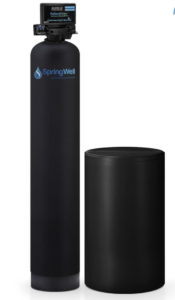
- Process: Ion Exchange
- Grain Capacity: 32,000 to 80,000 grains
- Flow Rate: 11 to 20 GPM
- Warranty: Lifetime on both tanks and valves
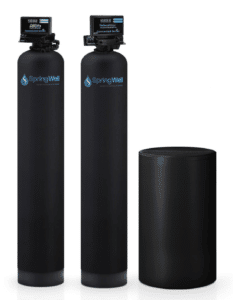
- Process: Ion exchange + Oxidation filtration
- Grain Capacity: 32,000 to 80,000 grains
- Flow Rate: 11 to 20 GPM
- Warranty: Lifetime on both tanks and valves
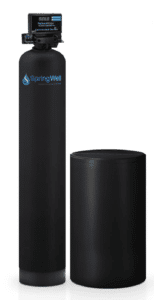
- Process: Ion exchange + tannin removal
- Grain Capacity: 30,000 to 45,000 grains
- Flow Rate: 12 to 15 GPM
- Warranty: Lifetime on both tanks and valves
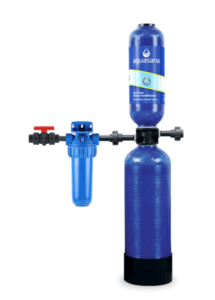
- Process: Crystallization via SCM tech
- Grain Capacity: 42,000
- Flow Rate: 7 GPM
- Warranty: 6 years
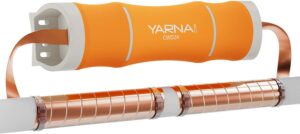
- Process: Electromagnetic impulses
- Grain Capacity: No limit
- Flow Rate: No limit
- Warranty: 10 years
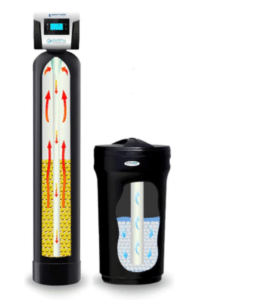
- Process: Ion exchange
- Grain Capacity: 24,000 – 80,000
- Flow Rate: 6 to 11 GPM
- Warranty: Lifetime warranty on tanks and 10 years on valves
Best Well Water Softener Systems:
- Best Overall: Springwell SS1 Water Softener | Jump to Review
- Best Water Softener for Well Water With Iron: Springwell Filter & Softener Combo | Jump to Review
- Best for Well Water With Tannins: Springwell Tannin Removal System | Jump to Review
- Salt-Free Option: Aquasana Salt-Free Conditioner | Jump to Review
- Best Electronic Descaler: Yarna Capacitive | Jump to Review
1. Springwell Salt-Based Well Water Softener
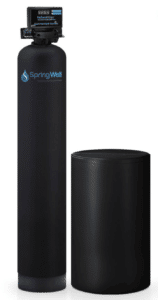
- Process: Ion Exchange
- Grain Capacity: 32,000 to 80,000 grains
- Flow Rate: 11 to 20 GPM
- Warranty: Lifetime on both tanks and valves
- Huge grain capacity and high flow rate
- Little maintenance required
- Bluetooth-controlled regeneration cycle
- Lifetime warranty
- Trusted and well-established brand in the industry
- Installation requires plumbing experience
- Big unit
The Springwell Salt-Based Water Softener is the best well water softener system if you’re looking to soften water for 1 – 7 bathrooms. It comes with 32k – 80k grain capacity options, metered regeneration, and up to 20 GPM water low rate.
When you head to Springwell’s product page, you’ll see that the first option you have is a 1-3 bathroom model that features a 32k grain capacity. As most of the other softening systems in its price range on the market offer 20k-30k for 1-3 bathrooms, this one gives you a lot of bang for your buck.
In addition, if you have more bathrooms in your house or if you’re looking for a softener for an office or a restaurant, Springwell has options for 4-6 (48k grain capacity) and 7+ bathrooms (80k grain capacity) as well.
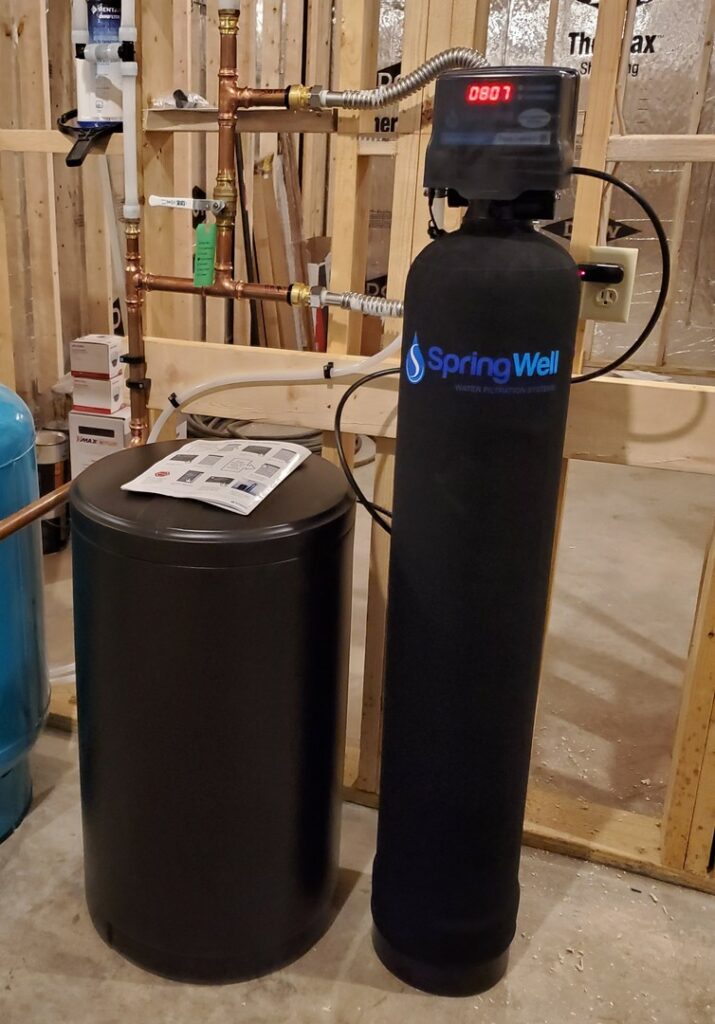
Furthermore, the flow rate of 11 GPM this salt-based water softener offers is more than capable of accommodating households that have 1 to 3 bathrooms as the flow rate of its peers varies only between 7 to 10 GPM. There are more options for bigger spaces as well: 13 GPM for 4-6 bathrooms or 20 GPM for 7+ bathrooms. Of course, if you’re in the market for the grain capacity and flow rate suitable for 4-6 or 7+ bathrooms, you’ll need to make a slightly bigger investment.
This Springwell water softener is a conventional ion-exchange unit that replaces mineral ions with those of sodium through a salt-based regeneration cycle. However, it’s remarkable how effective it is when you compare it to other models: less limescale formation, longer lifespan for appliances, better laundry, dish-washing, and bathing performance, and less hassle overall.
The salt system head this softener uses makes monitoring the system easier, so it’s a feature that truly stood out for us. This particular system comes with a Bluetooth app that allows you to set and control the regeneration cycle that roughly takes an hour or so.
In our experience with softeners, an app can come in handy since most softeners regenerate automatically, which then causes disruptions in the water flow. With the Springwell Salt-Based, you can set the cycle to run at a time when you don’t use water, which is super convenient.
The only other maintenance requirement is to add salt to the brine tank. This is not a big deal as you’re only going to do it once or twice a year. The brine tank is capable of holding 200lbs of salt, and the system makes use of only 40lbs of it in two months.
The Springwell Salt-Based comes with a lifetime warranty for both its tanks and valves. Its installation requires the assistance of a professional plumber or knowledge and experience in plumbing, but it’s only 1 to 3 hours of work. Just keep in mind that it’s quite a big unit, which might make the installation tricky, especially if you’re already short of space.
2. Springwell Filter & Water Softener for Well Water With Iron
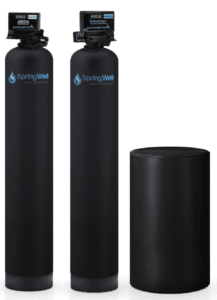
- Process: Ion exchange + Oxidation filtration
- Grain Capacity: 32,000 to 80,000 grains
- Flow Rate: 11 to 20 GPM
- Warranty: Lifetime on both tanks and valves
- Iron filtration is state-of-the-art
- Takes care of hydrogen sulfide as well
- Huge grain capacity and high flow rate
- Little maintenance required
- Bluetooth-controlled regeneration cycle and electronic control valve for the iron filter
- Lifetime warranty
- Expensive
- Takes too much space with its three big tanks in total
Does your well water have so much iron that you’re worried that a standard water softening unit can’t handle it? Then you’ll find that the Springwell combination of water softener and iron filter is the perfect solution.
Iron in well water is a common problem in the United States. Although its levels in water rarely exceed 10 parts per million (ppm), it still reaches up to 6-7ppm in some locations. Not even our top water softener, the Springwell Salt-Based, is equipped to deal with such high levels.
So, Springwell combined that same model with an iron removal system that comes with its own separate tank. Everything else about the system remains the same, you can still find all the features that make the Springwell Salt-Based Water Softener great: it has the same grain capacity and flow rate options, and it’s still quite effective against the minerals that give the water its hardness.
The difference is that the added iron filter also removes up to 7ppm of iron, 8ppm of hydrogen sulfide, and 1ppm of manganese. As that much iron gives the water a brown color and hydrogen sulfide is often the culprit for the rotten eggs smell that comes from the water, this filter is truly a game-changer.
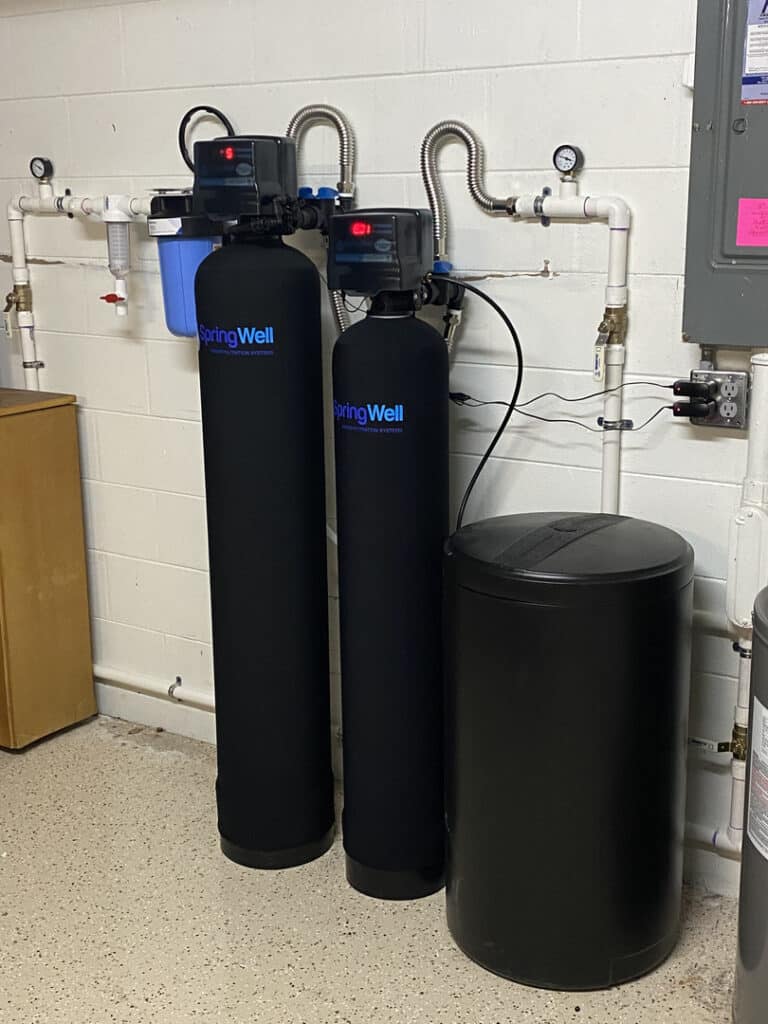
The SpringWell Air Injection Oxidizing Filter System (AIO) is the oxidizing agent that removes the iron, hydrogen sulfide, and manganese. The AIO is responsible for creating an air pocket at the top section of the filter tank.
When the water flows through this pocket, the said contaminants are oxidized and trapped in a green sand bed. The contaminants are then flushed out via a backwash cycle and the air pocket is refreshed.
Similar to the salt system head of the Springwell softener, this filtration system features an electronic control valve that only needs to be programmed once. After that, it’ll keep filtering out iron, sulfur, and manganese, and keep your water free of malodors and weird coloring.
Unlike the softening system, filters don’t come in three options: Springwell offers two, but they still give you enough flexibility. Those who have 1 to 4 bathrooms should opt for the WS1 model that has a 12 GPM flow rate, while the WS4 with its 20 GPM flow rate is ideal for 4+ bathrooms.
Of course, soft water that’s completely free of iron, manganese, and unpleasant odors comes with a price. The Springwell Well Water Filter With Softener is easily the priciest system on our list.
Moreover, remember how we said the Springwell Salt-Based Softener is bulky? Well, in this combo system, it’s also accompanied by another tank, which makes it even bigger and bulkier. So, make sure you have a suitable place for it before deciding to purchase it.
If you’re looking for more iron filter options, check our article on water filters for well water, and our guide to whole house iron removal systems.
3. Aquasana Salt-Free Well Water Conditioner System
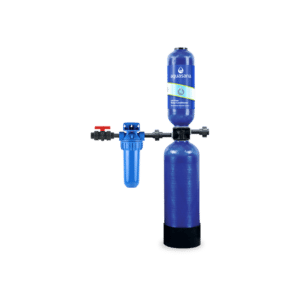
- Process: Crystallization via SCM tech
- Grain Capacity: 42,000
- Flow Rate: 7 GPM
- Warranty: 6 years
- Affordable
- Doesn’t need to be plugged in and doesn’t waste water
- Eco-friendly
- Can be placed anywhere since it’s small
- Features a sediment pre-filter
- Pre-filters need to be replaced bi-monthly
- 6-year warranty
- Instruction manual isn’t really helpful
The Aquasana Salt-Free Water Conditioner is one of those water softeners you don’t expect much from in the first place because it’s quite affordable, but are pleasantly surprised when it delivers. For a salt-free softening system in its price range, its grain capacity and overall efficiency are praise-worthy.
Moreover, it’s an excellent eco-friendly option. See, salt-based softeners add sodium to the water, which degrades soil. When wastewater is flushed, the chloride ions in salt are released into the environment and sometimes even into the groundwater.
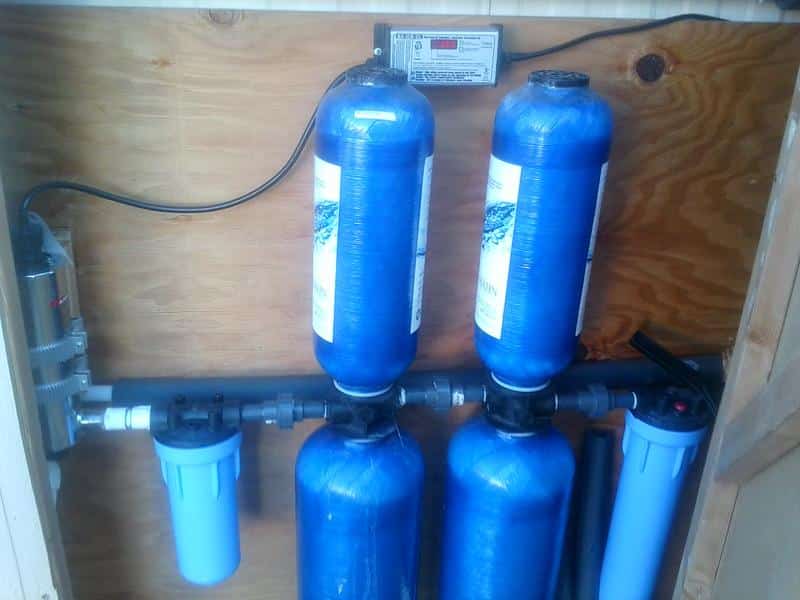
With the Aquasana Salt-Free Conditioner, there are no such concerns. Aquasana’s very own Scale Control Media (SCM) technology transforms active mineral molecules into inactive and microscopic crystals, thus neutralizing them. That way, it also reduces scale formation and corrosion and provides better quality water for bathing and laundry.
In comparison to the Springwell model above, it’s quite a small unit as well, so it’s easier to find a spot in your home. However, don’t be deceived by its size, as its 42,000 grain capacity is quite enough to provide for small households.
Unlike many other softeners, you don’t even have to plug it in, since salt-free also means that there’s no need for a regen cycle or drainage. As long as it’s connected to the piping system of your house, it’s going to condition your water.
The unit also features a pre-filter that prevents sediment and dirt from entering the softening system. As sediment and dirt are responsible for many water softener issues, from clogs to wearing down resin beads, the inclusion of a sediment pre-filter is a must if you want to prolong the lifespan of the device.
However, there’s a downside to this pre-filter: it increases maintenance requirements. It needs to be replaced on a bi-monthly basis; otherwise, it may reduce the effectiveness of the unit, reduce the flow rate, and eventually lead to a system malfunction.
Moreover, similar to the Springwell Salt-Based Water Softener, the installation of the Aquasana requires the help of a plumber. It also has only six years of warranty, which is equal to the lifespan the company attributes to the product. Considering the filter replacements and short lifespan, its affordable price might seem less like a bargain in the long run.
Lastly, although an experienced plumber can handle its installation quite easily, we found the instruction manual to be of little help. For DIYers who have no experience in plumbing, that might create some difficulties.
If you need more salt-free water softener options, check our article on the best salt-free water softener systems.
4. Springwell Tannin Removal System

- Process: Ion exchange + tannin removal
- Grain Capacity: 30,000 to 45,000 grains
- Flow Rate: 12 to 15 GPM
- Warranty: Lifetime on both tanks and valves
- Effective tannin removal
- Good grain capacity and flow rate
- Low maintenance
- Lifetime warranty
- A downgrade from other Springwell softening systems
- Big unit
- Expensive
We really like the Springwell STR Softener and Tannin Removal System simply because it’s the best tool to treat well water that has high tannin levels. Moreover, its softening capabilities are almost on par with the best on the market.
Tannins are organic, complex, and insoluble bio-molecules that can be naturally introduced to water through surface water runoff, decaying vegetation, or peaty soil. They can give water a brown or yellow hue as well as a tangy taste and musty odor.
They also cause yellow or brown stains on kitchen appliances, faucets, and clothes. Add to that the abrasive effects of hard water, and everything that your untreated well water touches will just lose its appeal to you.
Although tannins pose no health hazards and are only considered to be an aesthetic nuisance, none of the properties of tannin-rich water are actually pleasant. Therefore, it’s best to remove them, and there is no other system on the market that can do it better than the Springwell STR.
Unlike the Springwell combo we reviewed just above, the tannin removal doesn’t take place in another tank. It all happens in one single tank thanks to the high-capacity resin bed provided by Springwell.
This resin is able to have more contact time with water as it passes through. As a result, it has more time to neutralize hard water minerals as well as to absorb tannins.
Although the other water softeners may also absorb tannins, their resin beds can get covered with tannins quite easily and eventually become ineffective. That’s not a problem with the Springwell STR since the resin is specifically designed for this purpose.
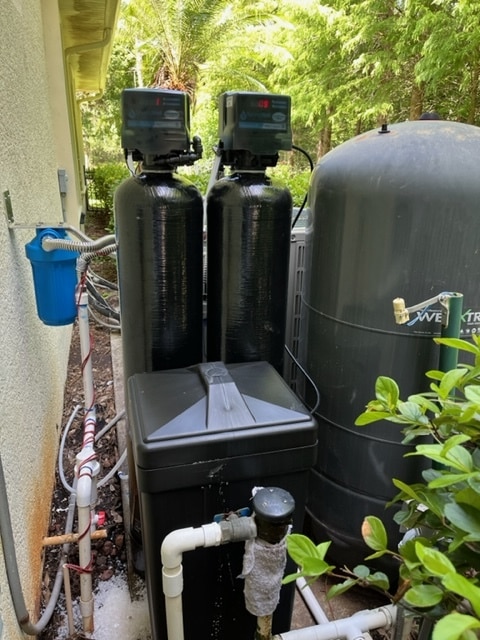
The system comes in two models: the STR 1 for houses with 1 to 3 bathrooms and the STR 4 for houses that have more than 4 bathrooms. While the STR 1 entertains a grain capacity of 30k and a flow rate of 12 GPM, the STR 4 offers a 45k grain capacity with a 15 GPM flow rate.
Similar to other Springwell products that made it to our list, the Springwell STR has a lifetime warranty. Moreover, with the Bluetooth app that allows you to monitor its condition, it’s almost maintenance-free.
The extra feature of tannin removal comes with its spike in price, but not nearly as big as the filter and softener combination from Springwell we just discussed. Furthermore, although both the softening and tannin removal take place in one single tank, it’s still a big unit.
Lastly, we have to admit that the grain capacity and flow rate of the Springwell STR pale in comparison to other Springwell softening units. However, if you have a serious tannin problem you want to prioritize, we think that can easily be overlooked.
5. Yarna Capacitive Water Descaler for Well Water
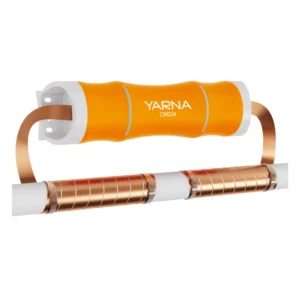
- Process: Electromagnetic impulses
- Grain Capacity: No limit
- Flow Rate: No limit
- Warranty: 10 years
- Innovative technology
- Unlimited grain capacity and flow rate
- Doesn’t replace minerals, so the minerals are still part of our diet
- Easy to install
- Little to no maintenance
- Doesn’t take any space
- Very affordable
- You start to reap the benefits after 2 weeks of use, results aren’t immediate
The Yarna Capacitive isn’t a water softener; it’s actually a little device referred to as a descaler. However, despite its size, it supports any kind of water pressure and flow rate, and even more impressively, it has unlimited grain capacity, which makes it special.
Unlike any of the other units on our list, the Yarna Capacitive Descaler doesn’t have a tank, and it doesn’t utilize technologies like ion exchange or crystallization. Rather, it neutralizes the mineral molecules in hard water by sending electrical currents.
To that end, it features two essential components: a signal cable that needs to be wrapped around the main water pipe leading to the household (Yarna’s own Ultra Flat Impulse Bands™) and a high-frequency electromagnetic field. Moreover, the electrical current and the frequency of the signals are controlled by a microchip.
The electrical impulses generated by the electromagnetic field reach the water inside the pipe via the signal cable. They then form another frequency field that manipulates the hard water molecules to prevent them from bonding together.
As a result, the limescale formation in appliances and abrasion in pipes and faucets are significantly reduced as the minerals can’t stick to surfaces anymore. Furthermore, the unit provides better water for laundry and bathing as it also eliminates scum.
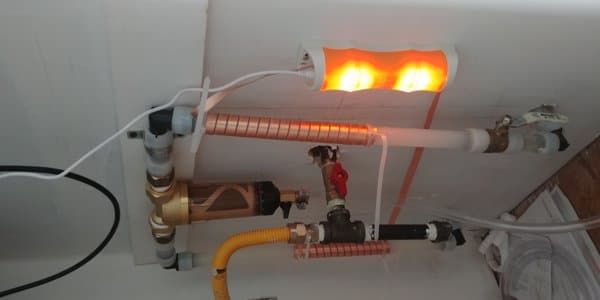
What we specifically like about the Yarna Capacitive Descaler is that it doesn’t replace mineral ions with sodium ones as salt-based water softeners do. The water that’s softened with this descaler still has minerals in it; it’s just that these minerals just go down the drain without damaging clothes, appliances, and the plumbing system.
In addition to that, minerals in water are actually quite beneficial to our health and drinking water is one of the main sources of mineral intake. So, the fact that the Yarna Descaler doesn’t completely eliminate them or replace them with sodium is very positive.
Also, considering that sodium can degrade soil and that plants don’t really enjoy mineral-free water, it’s easily the most eco-friendly device that you can use to soften water.
The uniqueness of the system might make you think that the installation process will be a hassle and require professional assistance, but that’s not the case either. The only thing you need to do is pick a good spot for it and wrap its cable around the pipe carefully. The instruction manual and the video guide you can find on Yarna’s website are quite helpful in that regard.
The bulky water softeners that come with a primary tank and a brine tank can sometimes be very difficult to place. There’s no such problem with the Yarna Descaler; it can be mounted to any wall or pipe, and it’ll never get in your way.
It requires very little maintenance unless it malfunctions, and when it malfunctions, you can just make use of its 10 year warranty. As a cherry on top, it’s the most affordable product on our list, and the efficiency you’ll get from it makes it a very good bargain.
However, you’ll only start to reap its benefits after a couple of weeks of use since electromagnetic impulses require a bit of time to adjust to the water’s hardness. Still, the end result might just be worth the wait.
6. SoftPRO Elite Well Water Softener System

- Process: Ion exchange
- Grain Capacity: 24,000 – 80,000
- Flow Rate: 6 to 11 GPM
- Warranty: Lifetime warranty on tanks and 10 years on valves
- Up-flowing regen cycle is economical and eco-friendly
- Affordable
- Good grain capacity options
- Prevents bacterial growth inside its tanks
- Precision brining saves salt
- Installation takes too long
- Flow rate options are too low compared to other models
- Unreliable quick installation guide
The SoftPRO Elite isn’t as cutting-edge as the Yarna Capacitive, but for a traditional salt-based water softener, it’s as innovative as it gets while remaining affordable. That’s mainly thanks to its up-flowing regeneration process that makes it more eco-friendly and economical.
Most water softening devices have a down-flowing regen operation in which the brine solution flows down the primary tank (resin tank) of the unit. Considering that the resin is placed at the bottom of the tank, it takes a bit of time for the solution to reach the resin.
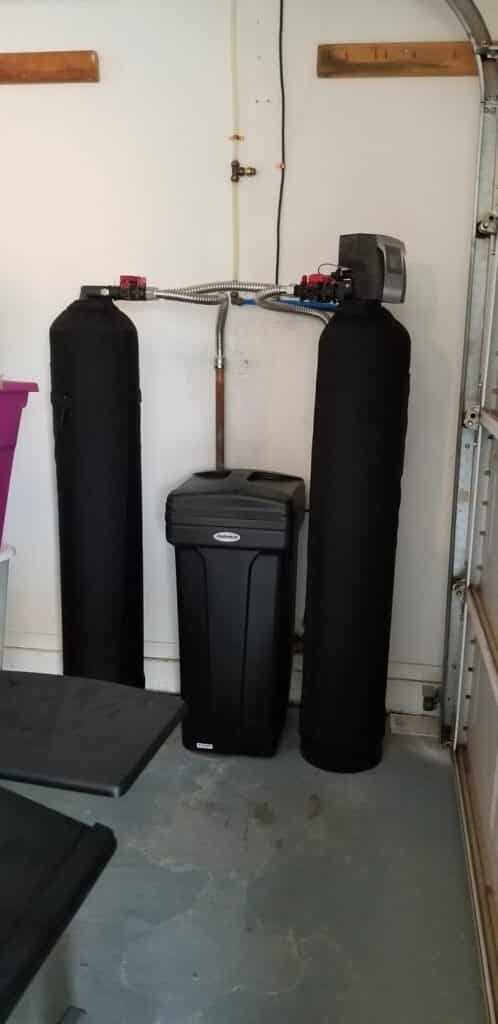
In an up-flowing regen process, on the other hand, the first thing the brine water touches is the resin. It means that the resin is regenerated when the solution is at its most potent, which prolongs its lifespan and saves salt in the long run.
Moreover, since the water that comes from the bottom and travels to the top will inevitably create a lift, resin tends to spread inside the tank. It allows for more contact surface compared to down-flow, and in the end, the resin is cleared and regenerated more evenly and thoroughly.
In addition, the regen process is based on a technology called Precision Brining carried out by the computer of the device. In Precision Brining, only 70% of the solution is pre-made. When the regen time comes, the computer automatically calculates how much brine is needed to regenerate the weakened resin and tops the pre-made solution with exactly that amount and no more.
Since the amount of salt used in the regen process is significantly reduced, the levels of sodium released to the environment when the system flushes itself aren’t as high as with some of its peers, which makes it eco-friendly. Depending on your usage, it can help you save $500 a year as well, due to low salt consumption and better handling of resin compared to conventional products.
Furthermore, when the softening capacity decreases below 3% on days when you use too much soft water, the unit automatically initiates a short salt recharge that only takes fifteen minutes. This helps it function efficiently until the time for preset regeneration comes, which is at 2am.
Sometimes, bacteria settling and growing inside water softener tanks due to in-operation of the system can lead to breakdowns in the system, but that’s not a possibility with the SoftPRO Elite. When the system isn’t activated for seven days, it automatically runs a refresh cycle to keep the tanks clean.
Similar to the Springwell models above, the SoftPRO Elite comes with different grain capacity and flow rate options. While the grain capacity options are in the range of 24,000 to 80,000, its flow rate options are as follows: 6-7 GPM, 8-10 GPM, and 11+ GPM. Although the grain capacity range is as good as it gets, the flow rate numbers of the unit are not the best when compared to the Springwell softeners.
That said, despite the lifetime warranty of tanks, the SoftPRO only offers a 10 year warranty for the valves. Moreover, the installation of the system might take more than four hours even for a professional, and the discrepancies between the quick installation guide online and the instruction manual certainly don’t help matters.
Our Review Criteria for Well Water Softeners
We evaluated well water softener systems based on:
- Grain capacity
- Water pressure/flow rate
- NSF certifications
- Process/technology
- Ease of installation
- Maintenance requirements
- Warranty
- Price
Below, you’ll find detailed explanations for each as well as comparison tables that show how these devices fare against the others on our list.
Grain Capacity
Grain capacity is a term used to describe how much hardness a water softener can remove from the water. This feature is determined by the efficiency of the resin beads and the sodium coat over the resin.
Traditional water softeners employ a process known as ion exchange. During this process, the molecules of minerals like calcium and magnesium are trapped in resin and replaced with sodium ions. So, as the capacity of the unit to trap mineral molecules increases, its grain capacity will do so as well.
That said, the product we picked as best in this category, the Yarna Capacitive, doesn’t operate via ion exchange. Instead, it utilizes electric impulses to eliminate mineral ions. Thanks to this innovative tech, it has an unlimited grain capacity.
| Water Softeners | Grain Capacity |
|---|---|
| Yarna Capacitive | Unlimited |
| SoftPro Elite | 24,000 – 80,000 |
| Springwell Salt-Based | 32,000 – 80,000 |
| Springwell Softener + Iron Filter | 32,000 – 80,000 |
| Aquasana Salt-Free Conditioner | 42,000 |
| Springwell Tannin Removal System | 30,000 – 45,000 |
Flow Rate
Pretty self-evidently, flow rate refers to the amount of water that a softening device is able to process in a given period. It’s usually measured in gallons per minute (GPM).
When the water is getting processed, it passes through several parts of the softener, namely, the float valve, control valve, bypass valve, and the overall distribution system. All these parts have an effect on the flow rate of the water softener.
In addition, the efficiency of the resin and the quality of salt you use might play a role in the amount of water you’ll get from your faucets.
The Yarna Capacitive also takes the lead when it comes to flow rate. It features a system in which the water isn’t processed like in a standard softening device. Rather, it just passes through without any intervention except for electric impulses, which allows it to handle any kind of water pressure and flow rate.
| Water Softeners | Flow Rate (GPM) |
|---|---|
| Yarna Capacitive | Unlimited |
| Springwell Salt-Based | 11-20 |
| Springwell Softener + Iron Filter | 11-20 |
| Springwell Tannin Removal System | 12-15 |
| SoftPro Elite | 6-11 |
| Aquasana Salt-Free Conditioner | 7 |
NSF Certifications
The National Sanitation Foundation is an organization that tests, inspects, and certifies products that might have a health impact in industries like food, automotive, construction, and inevitably, water and water-related technologies like filtration systems and softening devices.
Such water treatment devices are independently tested and certified by the NSF to ensure that they remove all the contaminants they claim to remove. In that sense, NSF certifications are the only proof you have that a water treatment device is doing what it should.
That said, the NSF/ANSI 44 is the only relevant certification for water softeners since these devices don’t actually remove any contaminants. The only proof that the NSF/ANSI 44 establishes is that the device operates on an ion exchange process recharged by sodium or potassium chloride.
Only two of the devices on our list hold an NSF/ANSI 44 certification: the SoftPro Elite and the Aquasana Salt-Free. However, the absence of it doesn’t mean that the other devices won’t soften water; as we’ve tested all these units ourselves, we can assure you that they’re capable of functioning efficiently.
| Water Softeners | NSF/ANSI 44 Certifications |
|---|---|
| SoftPro Elite | Yes |
| Aquasana Salt-Free Conditioner | Yes |
| Springwell Salt-Based | No |
| Springwell Softener + Iron Filter | No |
| Springwell Tannin Removal System | No |
| Yarna Capacitive | No |
Process
By process, we mean the technology that a softening unit utilizes to eliminate minerals.
We’ve already established that conventional softening devices employ ion exchange, in which mineral molecules are replaced with sodium. But that’s not all. There are also salt-free softeners that use potassium chloride instead of salt (sodium chloride).
The only salt-free option on our list, however, the Aquasana Salt-Free Conditioner, uses a special technology called Scale Control Media. With this tech, instead of replacing mineral molecules, the device just neutralizes them through crystallization.
In cases where there’s an excessive amount of iron in the groundwater, an iron filter is thrown into the mix as well, as in the case of the combo offered by Springwell. Similarly, when there’s too much tannin in the water source, Springwell adds a tannin removal media, as is the case with this, second, 2-in-1 system on our list.
However, the most innovative tech is found in the Yarna Capacitive Descaler. This unique product completely does away with ion exchange and uses electric impulses to break the bonds of mineral molecules.
| Water Softeners | Process |
|---|---|
| Yarna Capacitive | Electromagnetic impulses |
| Springwell Softener + Iron Filter | Ion exchange (salt) + iron filtration |
| Springwell Tannin Removal System | Ion exchange (salt) + tannin removal media |
| Springwell Softener | Ion exchange (salt) |
| SoftPro Elite | Ion exchange (salt) |
| Aquasana Salt-Free Conditioner | Crystallization |
Ease of Installation
Water softener devices are often bulky, and to install them, you need experience and knowledge in plumbing. In addition, you need plumbing tools like a wrench, pipe cutter, PVC glue, plumber’s tape, and drill.
The products on our list are no exception to that rule. Only the installation of Yarna Capacitive can be handled by a non-professional and without any tools since it just needs to be connected to a pipe and plugged in. Moreover, its installation video and manual are pretty thorough.
| Water Softener | Ease of Installation |
|---|---|
| Yarna Capacitive | Doesn’t require professional help |
| Springwell Softener + Iron Filter | Professional help required |
| Springwell Tannin Removal System | Professional help required |
| Springwell Softener | Professional help required |
| SoftPro Elite | Professional help required |
| Aquasana Salt-Free Conditioner | Professional help required |
Maintenance Requirements
Normally, taking care of a softener is quite easy. You just need to add softener salt to the brine tank every now and then and check whether there are any clogs in the system or not, and the system will continue operating effectively.
However, not all the systems on our list are traditional softeners. Therefore, each has its own unique requirements. For example, the Springwell Softener + Iron Filter requires you to change the iron filter regularly depending on the iron levels in your well.
In addition, the Aquasana Salt-Free Conditioner features a sediment pre-filter that needs to be replaced once the sediment it has accumulated starts to affect the water flow.
The Yarna Capacitive Descaler, on the other hand, is as low-maintenance as it gets. It doesn’t have any parts that can be clogged, it doesn’t feature any filters that need to be replaced, and it doesn’t even make use of salt or potassium. It just needs to be plugged in to keep on softening your water.
Among the more traditional softening systems on our list, the SoftPro Elite takes the cake. It uses less salt than its peers, it has no pre- or post-filters, and it features a tank jacket that prevents external damage.
| Water Softeners | Maintenance Requirements |
|---|---|
| Yarna Capacitive | Little |
| SoftPro Elite | Moderate |
| Springwell Salt-Based | Moderate |
| Aquasana Salt-Free Conditioner | High |
| Springwell Softener + Iron Filter | High |
| Springwell Tannin Removal System | High |
Warranty
The warranty shows how much trust the company has in its product. In addition, as the period of warranty increases, the money you’ll spend on maintenance when a malfunction occurs decreases. Both these factors combined make one of the most important criteria to look for when you’re buying a water softener for your well.
In that sense, the 6-year warranty the Aquasana Salt-Free Conditioner has isn’t really promising, especially if you take into account that all the other softening systems on our list have a lifetime warranty on their tanks.
We should also note that, while the lifetime warranty of the Springwell systems extends to their valves as well, the SoftPro Elite offers only a 10-year warranty on its valves. The Yarna Capacitive, on the other hand, comes with a 10-year warranty overall accompanied by a 365-day money-back guarantee.
| Water Softeners | Warranty |
|---|---|
| Springwell Softener + Iron Filter | Lifetime |
| Springwell Tannin Removal System | Lifetime |
| Springwell Softener | Lifetime |
| SoftPro Elite | Lifetime on tanks + 10-year on valves |
| Yarna Capacitive | 10-year |
| Aquasana Salt-Free Conditioner | 6-year |
Price
Generally, the price of water softeners on the market are in the range of $500 – $6,000 depending on their flow rate, grain capacity, quality, and brand. The systems on our list, on the other hand, have a different range: $299 – $3,200.
The decrease in the minimum price is mainly due to the most non-conventional item on the list: the Yarna Capacitive Descaler. Although it softens water, it’s not really a water softening system in the traditional sense as it doesn’t feature tanks or valves, and so, at only $299, it’s much more affordable than the others.
Springwell’s combination of water softener and iron filter with $3,189 is at the other end of the range. Since the system also features a high-end iron filter, the spike in the price is well-justified.
| Water Softeners | Price |
|---|---|
| Yarna Capacitive | $299 |
| Aquasana Salt-Free Conditioner | $799 |
| SoftPro Elite | $1,299 |
| Springwell Salt-Based | $1,478 |
| Springwell Tannin Removal System | $2,605 |
| Springwell Softener + Iron Filter | $3,189 |
How to Test Well Water for Hardness
There are two ways of testing well water for hardness. One is called the “quick soap suds test” and it’s the traditional way of assessing hardness. The other requires you to purchase a water hardness test kit.
- Quick soap suds test: Fill one third of a clean bottle with water from a tap at your house, add a little liquid soap to it, shake it for 20 seconds, and put it down. If your water is hard, the soap won’t create bubbles in the water. Instead, it’ll just turn cloudy.
- Home water hardness test kit: Water hardness test kits provide more scientific results. You can either purchase test strips that show water hardness in colored scales or order a more professional kit that you’ll send to a lab after taking a sample from your well. If you opt for the latter, you won’t only know about water hardness but the lab will also supply you with a comprehensive sheet that lists all the contaminants found in your well.
Disadvantages of Using Water Softener for Well
Removing or neutralizing minerals, lengthening the lifespan of appliances and clothes, and preventing limescale are definitely great benefits. There are also certain disadvantages to having soft water via water softening devices:
- Soft water isn’t ideal for plants and irrigation: Minerals like calcium, manganese, and iron are essential for plants to grow in health (especially for vital activity of photosynthesis) and soil to remain fertile. So, if you have a garden or if you’re cultivating plants indoors, it’s not recommended to water them with softened water.
- Too much sodium is not good for the environment: Traditional water softeners that operate on the basis of ion exchange replace mineral ions with sodium. When soft water is used and sent down the drain, sodium minerals end up in the soil. Even if the quantities are small, it can lead to soil degradation. When too much sodium is involved in the process, soil erosion is a likely outcome. That said, the Aquasana Salt-Free Conditioner and the Yarna Capacitive from our list don’t employ ion exchange. So, if you’re worried about soil and eco-friendliness, those two are your best options.
- Reduced mineral intake: Minerals in drinking water remain an important dietary source for calcium and magnesium, especially for infants and children. A mineral-free drinking water supply might cause health problems in bone growth, blood sugar, and immunity. Therefore, even if you need to install a softening unit, having a different, mineral-rich drinking supply might be more beneficial.
- Purchasing and installing a water softening device is quite costly: Although the Yarna Capacitive Descaler on our list shines with its affordability, it’s not a traditional softener. More often than not, traditional softeners cost more than $1,000. Depending on your flow rate, grain capacity, and pre-filtering needs, that number might reach up to $3,000-$5,000. If you factor in the installation cost and expenses you’ll make on softener salt and resin replacement, it will likely cost you even more.
Frequently Asked Questions
The Springwell combination of iron filter with softener, removes the most hard water minerals.
This well water filter is capable of eliminating up to 7ppm of iron, 1ppm of manganese, and 8ppm of hydrogen sulfide. In other words, it takes care of minerals and other contaminants that the softening system may not handle, and that makes it the most efficient system on our list and on the market.
Leaving out the Yarna Capacitive (as its price of $299 is an exception and as it’s not really a softener), the average of the prices of the systems on our list is $1,880. The most affordable one is the Aquasana Salt-Free Conditioner with $799 and the most expensive one is the Springwell Filter + Softener: $3,189.
However, depending on the grain capacity and flow rate options you’ll choose, you might end up paying almost $5,000.
To sum it all up, if you’re in the market for a softening system, expect to pay anywhere between $800 and $5,000.
What you need for installing a well softener depends on the type of the softener.
For example, we installed the Yarna Capacitive quite easily and without any tools since we just wrapped its signal cable around the pipes and mounted it on the pipe itself. However, that’s not the case for traditional softeners that come with tanks.
To install those, you need space. Nowadays, most American houses feature a water softener loop as a part of the piping system.
If there isn’t a loop in your house, you need to make sure that the system is placed in a location where it won’t get in your way and will stay out of harm’s way. For example, damp places can degrade the salt inside the brine tank and cause problems.
The following tools will come handy when trying to DIY-install a softening unit:
– Pliers and pipe cutter
– Plumber’s tape
– Drill
– Wrench
– Primer and glue
– Copper wire and hose clamps for grounding
– Shut-off valves
– Water connectors
– Zip ties
– Drain line(s)
– Power supplies (batteries)
Some of these items may already be included in the product package. So, make sure you ask the seller what’s included in the package or research the product before you buy it.
The average lifespan of a water softening system is 10 to 20 years.
You can prolong its life by replacing the resin before it goes bad, taking good care of the salt, and identifying and resolving issues like standing water in the brine tank as quickly as you can.
In addition, installing a water softener pre-filter and replacing that filter before it gets worn out might prolong the lifespan of the system.
Conclusion
To sum up, Springwell is one of the leading names and one of the most reliable brands in the water softening industry. We think their Salt-Based Water Softener is the best traditional softening system due to its grain capacity, flow rate, and easy maintenance.
In addition to that, for those whose wells have more iron than a water softening unit can handle, they offer a combination of an iron filter with softener. If your main problem is tannins in your well, Springwell has a state-of-the-art solution for that as well: the Springwell Tannin Removal System.
However, if you’re looking for an eco-friendly and budget-friendly water conditioning system, we recommend you check out the Aquasana Salt-Free Conditioner. If you’re open to innovation, then the Yarna Capacitive is the go-to item thanks to its unique tech, unlimited grain capacity and flow rate, and extreme affordability.
Lastly, the SoftPRO elite constitutes a good, inexpensive, and unconventional salt-based option. Thanks to its up-flowing regen process, it saves salt, protects resin, and promotes eco-friendliness.